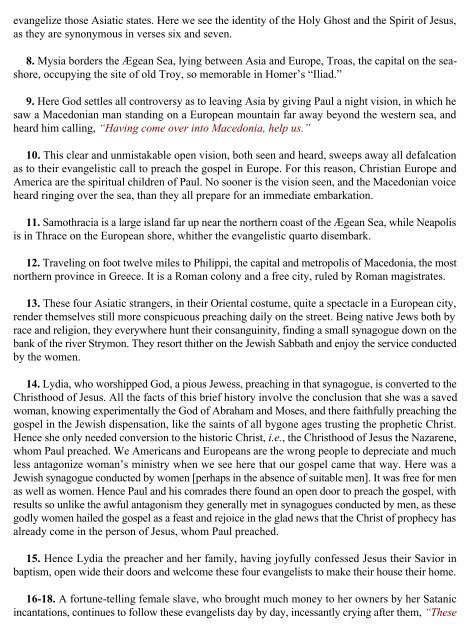Godbey's Commentary - Acts - Romans - Enter His Rest
Godbey's Commentary - Acts - Romans - Enter His Rest
Godbey's Commentary - Acts - Romans - Enter His Rest
You also want an ePaper? Increase the reach of your titles
YUMPU automatically turns print PDFs into web optimized ePapers that Google loves.
evangelize those Asiatic states. Here we see the identity of the Holy Ghost and the Spirit of Jesus,<br />
as they are synonymous in verses six and seven.<br />
8. Mysia borders the Ægean Sea, lying between Asia and Europe, Troas, the capital on the seashore,<br />
occupying the site of old Troy, so memorable in Homer’s “Iliad.”<br />
9. Here God settles all controversy as to leaving Asia by giving Paul a night vision, in which he<br />
saw a Macedonian man standing on a European mountain far away beyond the western sea, and<br />
heard him calling, “Having come over into Macedonia, help us.”<br />
10. This clear and unmistakable open vision, both seen and heard, sweeps away all defalcation<br />
as to their evangelistic call to preach the gospel in Europe. For this reason, Christian Europe and<br />
America are the spiritual children of Paul. No sooner is the vision seen, and the Macedonian voice<br />
heard ringing over the sea, than they all prepare for an immediate embarkation.<br />
11. Samothracia is a large island far up near the northern coast of the Ægean Sea, while Neapolis<br />
is in Thrace on the European shore, whither the evangelistic quarto disembark.<br />
12. Traveling on foot twelve miles to Philippi, the capital and metropolis of Macedonia, the most<br />
northern province in Greece. It is a Roman colony and a free city, ruled by Roman magistrates.<br />
13. These four Asiatic strangers, in their Oriental costume, quite a spectacle in a European city,<br />
render themselves still more conspicuous preaching daily on the street. Being native Jews both by<br />
race and religion, they everywhere hunt their consanguinity, finding a small synagogue down on the<br />
bank of the river Strymon. They resort thither on the Jewish Sabbath and enjoy the service conducted<br />
by the women.<br />
14. Lydia, who worshipped God, a pious Jewess, preaching in that synagogue, is converted to the<br />
Christhood of Jesus. All the facts of this brief history involve the conclusion that she was a saved<br />
woman, knowing experimentally the God of Abraham and Moses, and there faithfully preaching the<br />
gospel in the Jewish dispensation, like the saints of all bygone ages trusting the prophetic Christ.<br />
Hence she only needed conversion to the historic Christ, i.e., the Christhood of Jesus the Nazarene,<br />
whom Paul preached. We Americans and Europeans are the wrong people to depreciate and much<br />
less antagonize woman’s ministry when we see here that our gospel came that way. Here was a<br />
Jewish synagogue conducted by women [perhaps in the absence of suitable men]. It was free for men<br />
as well as women. Hence Paul and his comrades there found an open door to preach the gospel, with<br />
results so unlike the awful antagonism they generally met in synagogues conducted by men, as these<br />
godly women hailed the gospel as a feast and rejoice in the glad news that the Christ of prophecy has<br />
already come in the person of Jesus, whom Paul preached.<br />
15. Hence Lydia the preacher and her family, having joyfully confessed Jesus their Savior in<br />
baptism, open wide their doors and welcome these four evangelists to make their house their home.<br />
16-18. A fortune-telling female slave, who brought much money to her owners by her Satanic<br />
incantations, continues to follow these evangelists day by day, incessantly crying after them, “These
















